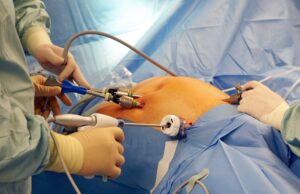
People with extreme and excessive obesity are frequently unable to be properly treated with diet and exercise alone. Such people may undergo bariatric surgery as a procedure to assist them in losing weight. Evidence suggests that bariatric surgery, especially when combined with healthy diet and lifestyle modifications after surgery, may reduce death rates for people with severe obesity.
By altering the digestive tract, bariatric surgery refers to surgical techniques that help patients lose weight. Gastric bypass and other weight loss surgeries, as well as other procedures, can all be referred to as “bariatric surgery.”
Now let us know about BMI(Body Mass Index):
In order to identify levels of obesity and evaluate whether bariatric intervention is necessary, the body mass index (BMI), a measurement of height in proportion to weight, is used. A BMI of over 40 kg/m2 or a BMI of over 35 kg/m2 in conjunction with serious health issues is referred to as clinically severe obesity.
Type 2 diabetes, arthritis, heart disease, and severe obstructive sleep apnea are health issues connected to fat. The use of adjustable gastric bands is permitted by the Food and Drug Administration (FDA) for individuals with a BMI of 30 kg/m2 or more and at least one of these diseases.
What are the principles of Bariatric Surgery:
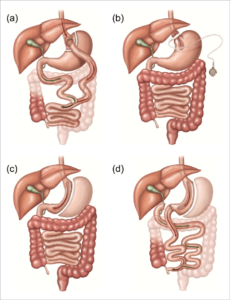
The main goals of bariatric surgery are to reduce food intake and intestinal and stomach absorption of nutrients.
The mouth is where food is chewed and combined with saliva and other secretions that contain enzymes to begin the digestion process. Once the food is in the stomach, it is broken down and combined with digestive juices to allow the body to absorb the nutrients and calories. As food enters the duodenum, the first section of the small intestine, where it is combined with bile and pancreatic juice, digestion intensifies.
The goal of bariatric surgery is to change or halt this digestive process so that food is not absorbed and broken down as usual. Patients can lose weight and lower their risk of obesity-related health hazards or diseases by consuming less calories and nutrients.
Types of Bariatric Surgery:
Depending on how much food the stomach can hold, how well the body can absorb nutrients, or a combination of the two, different consequences of bariatric surgery may be experienced. The most popular forms of bariatric surgery are the duodenal switch, adjustable gastric band, sleeve gastrectomy, and gastric bypass.
Gastric Bypass:

One of the most popular types of bariatric surgery is the gastric bypass procedure. The technique is divided into two steps, to put it simply. The top of the stomach is first separated from the other part of the stomach by a tiny pouch. When the first portion of the small intestine is split off, the bottom end is still connected to the newly developed little pouch in the stomach. The bottom of the small intestine is then joined to the top portion of the divided small intestine, which alters the food stream and results in alterations to gut hormones. This technique inhibits calorie and nutrient absorption as well as the amount of food the stomach can hold.
Sleeve Gastrectomy:
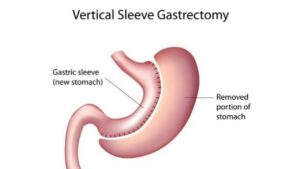
Involves cutting out about 80% of the stomach. What’s left is a sleeve, which is a tube-shaped pouch. The stomach can no longer hold as much food due to its reduced size. Additionally, it lessens the ghrelin hormone’s synthesis, which controls appetite.
Gastric Band:
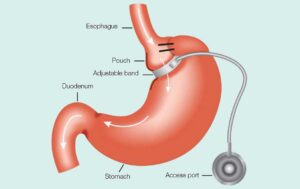
An inflatable band is wrapped around the top of the stomach as part of the adjustable gastric band, resulting in a smaller pouch above. Patients feel full more quickly and less food can be stored. As improvements are made over time, the band gets smaller.
Duodenal Switch:
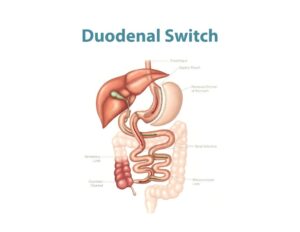
There are two elements to the Biliopancreatic Diversion with Duodenal Switch (BPD/DS). First, a tube-shaped pouch is made out of a part of the stomach (similar to sleeve gastrectomy). Second, the small intestine is largely bypassed. This limits the amount of food the stomach can hold and expedites the process of feeling full. The absorption of nutrients is also decreased. Although the procedure is very successful, there are higher risks, such as vitamin deficiency or starvation.
Why Bariatric Surgery is Done:
Having bariatric surgery can assist people who are extremely overweight lose weight and reduce their chance of developing serious, life-threatening health issues, including:
Heart condition
Stroke
Elevated blood pressure
Alcohol-unrelated fatty liver disease
Slumber apnea
Diabetes type 2
Conclusion:
Keep in mind that not everyone who is overweight should undergo bariatric surgery. Medical requirements must be met. When other weight-loss methods, including changing your diet and exercising more, don’t work, it’s frequently advised.. At Marinas Clinic, the best bariatric surgeon is available to help you with the surgery.. Our team assists you in choosing the ideal course of action for every person based on their needs. We meticulously assess each patient before determining the kind of operation you require. Our experts choose wisely how to approach you and gives you the best chance for a successful weight loss.
© 2024 Marinas Clinic All rights reserved.Powered by Zero Gravity Technologies.